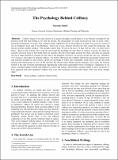The psychology behind celibacy
Abstract/
Celibacy began in the early church as an ascetic discipline, rooted partly in a neo-Platonic contempt for the
physical world that had nothing to do with the Gospel. The renunciation of sexual expression by men fit nicely with a
patriarchal denigration of women. Non virginal women, typified by Eve as the temptress of Adam, were seen as a source of
sin. In Scripture: Jesus said to the Pharisees, “And I say to you, whoever divorces his wife, except for unchastity, and
marries another commits adultery.” His disciples said to him, “If such is the case of a man with his wife, it is better not to
marry.” But he said to them, “Not everyone can accept this teaching, but only those to whom it is given. For there are
eunuchs who have been so from birth, there are eunuchs who have been made eunuchs by others, and there are eunuchs
who have made themselves eunuchs for the sake of the kingdom of heaven. Let anyone accept this who can.” (Matthew
19:3-12).Jesus Advocates for optional celibacy. For nearly 2000 years the Catholic Church has proclaimed Church laws
and doctrines intended to more clearly explain the teachings of Christ. But remarkably, while history reveals that Jesus
selected only married men to serve as His apostles, the Church today forbids priestly marriage. Also, today the Catholic
Church is the only Christian denomination experiencing world wide condemnation from “scandalous” allegations of sex
abuse committed against women and children by priests and bishops. Historically, scandals similar to these are known to
have appeared only after mandatory celibacy laws were first instituted, centuries after Christ. Why were these changes
made?

